De-actualising the Knowledge City
In an update to the special feature 'Teach Yourself Institutions' Mute, Issue 28, members of Barcelona based group, Yproductions, discuss the crisis of the cultural economy in Barcelona and present their own attempts to extract independent forms of knowledge production from the branded and gentrified city
For some reason Barcelona seems to be cool. So cool that one cannot travel away from it without having to justify why you are leaving such a wonderful place. Travel brochures say it is sunny all year round, adverts talk about its marvellous architecture and tourists preach about the coolness of its clubs, bars, pubs and prostitutes. Barcelona's culturescape seems to be crowded with events, exhibitions, gigs, magazines, fashion shows and every summer king Sonar manages to attract thousands, who enjoy three days and nights of music, sun and dope.
We who live here sometimes feel slightly reluctant to believe what people who come and spend three days here tell us about the city. Possibly it is true that Gaudi is a great architect and that being able to skateboard around the city centre is an exciting thing to do, but we also feel that the price we have to pay to enjoy such freedoms is sometimes high. Barcelona's centre may be one of the most gentrified of European city centres, but this has come at great cost to the residents of the area. Raval (which was always called 'barrio chino' until the town hall re-branded it) is a major site of conflict, with hundreds of residents being chucked out of their homes with no or minimal compensation (in the best cases they are paid the land value of the flats, not the market price), new hotels and 'cultural' complexes rising in their place. 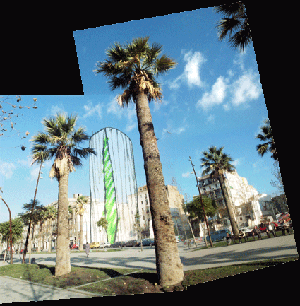 The redevelopment of Raval is one of the most ferocious cases of what here is now called 'mobbing' the ejection of tenants through less than legal means - and many in the city remember how a supposed paedophile case hit the media and led to the detention of a dozen people who happened to be part of the community group opposing the development of what we all know now as 'la Rambla del Raval', a great avenue recently opened in the heart of the city. These people remained in jail enough time for the building works to start, and after the trial was over it seemed that it all had been a great misunderstanding, nothing had really happened with children and they were all free to find themselves homeless, (there is an excellent film following the trial De Nens by Joaquim Jordi.
The redevelopment of Raval is one of the most ferocious cases of what here is now called 'mobbing' the ejection of tenants through less than legal means - and many in the city remember how a supposed paedophile case hit the media and led to the detention of a dozen people who happened to be part of the community group opposing the development of what we all know now as 'la Rambla del Raval', a great avenue recently opened in the heart of the city. These people remained in jail enough time for the building works to start, and after the trial was over it seemed that it all had been a great misunderstanding, nothing had really happened with children and they were all free to find themselves homeless, (there is an excellent film following the trial De Nens by Joaquim Jordi.
This is just one example out of dozens of similar events currently occurring throughout the city, as prices are rising at such a speed that makes it difficult for locals to continue living here, and in which labour precariousness has now become mainstream situation. Coolness is not causal or innocent.
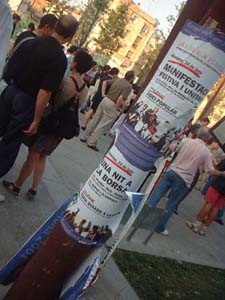 Barcelona as we know it is a brand that began to be engineered and designed sometime around 1986 (see Balibrea, M.'Barcelona: del modelo a la marca' http://www.desacuerdos.org/) The 1992 Olympic games were just the peak moment of a strategy that was being deployed quietly for many years. Some authors call it the 'Barcelona model',it consists of conceiving vast cultural projects which are in fact thinly disguised redevelopement strategies. One of the differences between this way of functioning and other regeneration plans that are currently being deployed over a string of cities all around the world is that in this case cultural agents are not the spearhead in these strategies, but instead massive cultural events are being used to change Barcelona's face and value, (for more information about the role artists have in the regeneration urban areas see David Panos 'Create Creative Clusters' Mute, Issue 28, 2004).The latest of these major 'art and culture' events happened last year, and although many agree it was not a great success in attendance, Forum2004 has managed after only one year to become a shopping mall, luxury hotels, a natural and private sea spa and a whole set of luxury apartments. It's not all that important that people get to enjoy the events, because they are cynically intended as an excuse to develop areas of the city.
Barcelona as we know it is a brand that began to be engineered and designed sometime around 1986 (see Balibrea, M.'Barcelona: del modelo a la marca' http://www.desacuerdos.org/) The 1992 Olympic games were just the peak moment of a strategy that was being deployed quietly for many years. Some authors call it the 'Barcelona model',it consists of conceiving vast cultural projects which are in fact thinly disguised redevelopement strategies. One of the differences between this way of functioning and other regeneration plans that are currently being deployed over a string of cities all around the world is that in this case cultural agents are not the spearhead in these strategies, but instead massive cultural events are being used to change Barcelona's face and value, (for more information about the role artists have in the regeneration urban areas see David Panos 'Create Creative Clusters' Mute, Issue 28, 2004).The latest of these major 'art and culture' events happened last year, and although many agree it was not a great success in attendance, Forum2004 has managed after only one year to become a shopping mall, luxury hotels, a natural and private sea spa and a whole set of luxury apartments. It's not all that important that people get to enjoy the events, because they are cynically intended as an excuse to develop areas of the city.
This 'Barcelona model' is not characterised by promoting vernacular culture or community engagement with the cultural scene. Instead its policy is one of sucking in consolidated cultural producers. By doing so Barcelona captures a great amount of symbolic capital that can rapidly be exchanged for money through attracting tourists, visitors and culture seekers. However, tourism is an entity that devours and can rapidly use up a city's pool of symbolic capital, so Barcelona must continually renew its activities and cultural agents.This is a place for disposable cultural producers and extended precarious existences.
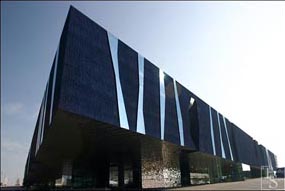 We, Yproductions, as a cultural production company are extremely conscious of how any cultural event can be sucked into this giant brand-machine and that as cultural producers we are key agents in the creation of symbolic and cultural capital for the Barcelona brand. We have been working on a series of different projects that range from organizing lectures, exhibitions or screenings to starting a videoart distribution company and producing a sitcom for local TV. All of these projects are usually critically charged and include some kind of reflection on the conditions of their production. This is one of the reasons why we decided to constitute ourselves as a private partnership, a way to provide our activities with enough economic autonomy and promote a much more ethical way of working, by becoming a part of the private sector. This is also one of the reasons why we started thinking about a project that could help to analyse and situate ourselves in the production line but trying to escape from the supply line of cultural projects that feeds the Barcelona brand. This is one of the biggest issues one has to confront when working here, there are a great number of cases in which 'alternative' or 'critical' art projects have been rapidly captured and reintroduced into the context of touristic and cultural display. A recent case is the 'Anarchist Route' through Barcelona. You could catch an open roof bus which took you to a number of places related to the anarchist movement in Barcelona, the bus stopped in some of the places so one could take a picture or frame their partners in such a radical place. The project was soon introduced into one of the blockbuster shows last year, 'Tourismos', which was funded by the Forum2004. It is also worth noting the tricky situation in which Naomi Klein found herself when she came to Barcelona to introduce her latest film on Argentina at MACBA (Barcelona Museum of Contemporary Art). A member of the audience asked her how she felt about the fact that the sponsors behind the event were the same corporations she was criticizing in her work. The activist -journalist turned filmmaker preferred not to comment.
We, Yproductions, as a cultural production company are extremely conscious of how any cultural event can be sucked into this giant brand-machine and that as cultural producers we are key agents in the creation of symbolic and cultural capital for the Barcelona brand. We have been working on a series of different projects that range from organizing lectures, exhibitions or screenings to starting a videoart distribution company and producing a sitcom for local TV. All of these projects are usually critically charged and include some kind of reflection on the conditions of their production. This is one of the reasons why we decided to constitute ourselves as a private partnership, a way to provide our activities with enough economic autonomy and promote a much more ethical way of working, by becoming a part of the private sector. This is also one of the reasons why we started thinking about a project that could help to analyse and situate ourselves in the production line but trying to escape from the supply line of cultural projects that feeds the Barcelona brand. This is one of the biggest issues one has to confront when working here, there are a great number of cases in which 'alternative' or 'critical' art projects have been rapidly captured and reintroduced into the context of touristic and cultural display. A recent case is the 'Anarchist Route' through Barcelona. You could catch an open roof bus which took you to a number of places related to the anarchist movement in Barcelona, the bus stopped in some of the places so one could take a picture or frame their partners in such a radical place. The project was soon introduced into one of the blockbuster shows last year, 'Tourismos', which was funded by the Forum2004. It is also worth noting the tricky situation in which Naomi Klein found herself when she came to Barcelona to introduce her latest film on Argentina at MACBA (Barcelona Museum of Contemporary Art). A member of the audience asked her how she felt about the fact that the sponsors behind the event were the same corporations she was criticizing in her work. The activist -journalist turned filmmaker preferred not to comment.
Now we are too self-conscious to pretend that things 'just happen'. We wanted to work on a project that could help to find ways and tools to reverse the uncomfortable situation in which culture is currently positioned. Also, we wanted to activate cultural producers as knowledge producers. We believe that Barcelona uses knowledge as part of its machinic guts to generate the image of itself that it will later display, so we needed to understand the production of knowledge in order to face the situation.
Obviously we are not alone in trying to analyse or trying to confront some of the issues previously mentioned, a collective named Sitesize http://www.sitesize.nethas recently organized a long series of weekly meetings, their was aim to see how to confront some of the gentrification processes occurring in the city. A selection of lawyers, urban developers, politicians and cultural producers met alongside a large number of the citizens affected by these processes and tried to work out collaborative strategies of resistance. Another collective working in the city is Ctrl i http://sindominio.net/ctrl-i is composed by people who after speaking publicly about their labour conditions working in MACBA were made redundant. They now work to create an awareness of these precarious work conditions and have recently managed to promote direct contracts between an art institution and its workers, saving the money that the middle company would usually benefit from. A group of people who worked under the name of 'Investigaccio' http://www.investigaccio.org organized the first 'Symposium of Activist research', a meeting attended by more than 200 people from across the world in which the production of knowledge and the relations between research, education and activism were discussed.
To escape from the city's cultural hotspot we started a project called Sant Andreu Free University (SAFU) , in a place in which we could meet, discuss and assess the city's potential to create knowledge, and see if a small community leisure space run by our friend Francesc in a neighbourhood in the outskirts of Barcelona could produce images, ideas or intentions.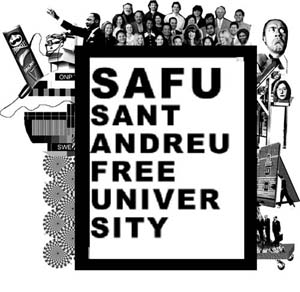 We invited a wide range of researchers, activists, theorists and artists in an attempt to map where we, as cultural producers, stand. But even more important, was the need to create the right atmosphere to grasp ourselves as possible centres for the production of knowledge. It is at this point that we need to envisage how important it is to understand who and from where hegemonic forms of knowledge are being produced to be able to see what aims these ways of knowing have. One of the most revolutionary theories and approaches to the production and management of knowledge comes from two Asian scholars, Ikujiro Nonaka and Hiotaka Takeuchi, authors of The Knowledge Creating Company. Oxford University Press, 1995. Their main thesis is that the recent Asian economic and industrial explosion has come about because of the introduction of knowledge into the productive core of some corporations. As opposed to standard western industrial practices, some Japanese corporations have worked thoroughly to introduce tacit knowledge (all those things that one knows and has embodied such as memories, skills, experience, etc.) into the productive system. They also see how important it is to know how to transform this tacit knowledge into explicit knowledge (all that which can be found in books, schools, guides, etc.). To do this the company has to create a space in which tacit knowledge can be socialised and thrown into an open environment. The role that corporations have here is to manage and re-distribute this potential knowledge that we all have inserted into our bodies. This also implies that we all can be knowledge producers, but we need to create the right circumstances for this tacit knowledge to be transformed into Knowledge (with its capital K). The self-acknowledgement of this can be a powerful weapon if one learns how to manage one's own knowledge. Nonaka and Tekeuchi's pioneering theory does not hierarchise knowledge, and in explaining how the value of created knowledge, depends directly on the space in which it has been produced. There is a great number of things that we virtually know but need a specific process (context, gender, power) for them to be actualised. We use our tacit knowledge unconsciously in the shape of skills, know how, or as a response to a given situation and it constitutes a great amount of our symbolic capital.
We invited a wide range of researchers, activists, theorists and artists in an attempt to map where we, as cultural producers, stand. But even more important, was the need to create the right atmosphere to grasp ourselves as possible centres for the production of knowledge. It is at this point that we need to envisage how important it is to understand who and from where hegemonic forms of knowledge are being produced to be able to see what aims these ways of knowing have. One of the most revolutionary theories and approaches to the production and management of knowledge comes from two Asian scholars, Ikujiro Nonaka and Hiotaka Takeuchi, authors of The Knowledge Creating Company. Oxford University Press, 1995. Their main thesis is that the recent Asian economic and industrial explosion has come about because of the introduction of knowledge into the productive core of some corporations. As opposed to standard western industrial practices, some Japanese corporations have worked thoroughly to introduce tacit knowledge (all those things that one knows and has embodied such as memories, skills, experience, etc.) into the productive system. They also see how important it is to know how to transform this tacit knowledge into explicit knowledge (all that which can be found in books, schools, guides, etc.). To do this the company has to create a space in which tacit knowledge can be socialised and thrown into an open environment. The role that corporations have here is to manage and re-distribute this potential knowledge that we all have inserted into our bodies. This also implies that we all can be knowledge producers, but we need to create the right circumstances for this tacit knowledge to be transformed into Knowledge (with its capital K). The self-acknowledgement of this can be a powerful weapon if one learns how to manage one's own knowledge. Nonaka and Tekeuchi's pioneering theory does not hierarchise knowledge, and in explaining how the value of created knowledge, depends directly on the space in which it has been produced. There is a great number of things that we virtually know but need a specific process (context, gender, power) for them to be actualised. We use our tacit knowledge unconsciously in the shape of skills, know how, or as a response to a given situation and it constitutes a great amount of our symbolic capital.
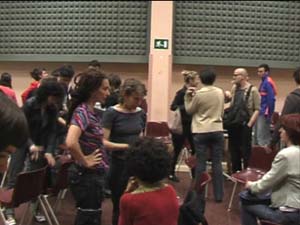 This helps to explain the growing importance that the management of knowledge has in the core of economic growth. The relationship between knowledge and economy is tight, and the possible gap between these two spheres is increasingly reduced. This irruption of knowledge into economy is bringing with it a long string of debates and problems concerning intellectual property and its derived law and rights. The widespread assertion of new legal positions and options such as copyleft licenses, Creative Commons licenseshttp://www.creativecommons.org and GPL http://www.gnu.org/copyleft/gpl.html give just a small indication of the implications for intellectual property and its commercial exploitation. There is a growing interest in privatising sites where knowledge can be produced or objects that deal directly with knowledge such as dictionaries, encyclopaedias but also software, literature, genetic databases, and chemical compositions ... placing intellectual property in the hotspot of moral, ethical, economic and political debates. Most of these new licences try to generate legal spaces of shared property, a common cultural resource pool, and facilitate the improvement and distribution of new commodities such as software Stallman, R. Free Software, Free Society. Free Software Foundation (2002).
This helps to explain the growing importance that the management of knowledge has in the core of economic growth. The relationship between knowledge and economy is tight, and the possible gap between these two spheres is increasingly reduced. This irruption of knowledge into economy is bringing with it a long string of debates and problems concerning intellectual property and its derived law and rights. The widespread assertion of new legal positions and options such as copyleft licenses, Creative Commons licenseshttp://www.creativecommons.org and GPL http://www.gnu.org/copyleft/gpl.html give just a small indication of the implications for intellectual property and its commercial exploitation. There is a growing interest in privatising sites where knowledge can be produced or objects that deal directly with knowledge such as dictionaries, encyclopaedias but also software, literature, genetic databases, and chemical compositions ... placing intellectual property in the hotspot of moral, ethical, economic and political debates. Most of these new licences try to generate legal spaces of shared property, a common cultural resource pool, and facilitate the improvement and distribution of new commodities such as software Stallman, R. Free Software, Free Society. Free Software Foundation (2002).
SAFU is conscious of all of this. Our aim was always to start an experimental cultural project that could try to integrate part of these corporate theories and develop them in a less productive (and competitive) space. We didn't do this to start some kind of critique of these strategies based on mimicry, but use the produced knowledge and literature on the issue as a tool that we could capture and re-deploy giving it a new political dimension. To put all of this into practice the only way forward we saw was to create a contingent and in many cases accidental structure. It is through this sructure that we managed to organise reading groups, lectures, workshops and seminars. We also invited a series of researchers, activists, musicians and theorists to share their points of view and help to draw new lines of research, among others we shared invited people such as Cristina Vega, Mattin, Miquel Noguera, Ivan Orellana, Anthony Iles, Marina Vishmidt and Maria Ruido, who talked about their lives, experiences, opinions and helped to envisage new strategies or lines of flight. Looking upon the project we have to admit that in some aspects it failed to generate the right climate in which everyone felt compelled to share their own views and in some cases the gap between speakers and audience was big. Possibly one of our mistakes was to target people belonging to the art scene as people who could be interested and benefit from these meetings. It is also true that we could all see the Cartesian gap there among us. There is great difficulty to envisage oneself as someone able to produce knowledge, it is also complicated to understand that one's opinions might be relevant. We have suffered the hierarchies of proper Knowledge and the professional sites in which one can achieve it, and to break that tradition is one of our future aims that has arisen from the experience of this project.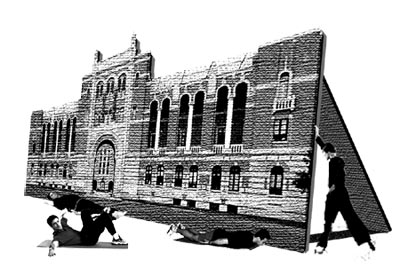 One of the themes often discussed during SAFU was related to the appropriation of symbolic knowledge and its redistribution. Barcelona lives on its distinctiveness, on its different events and we as cultural producers have to be aware of this; that we are the main suppliers but we are not being treated as such. We centred our talks on how to negotiate with politicians using cultural and symbolic capital as our strong points. Amongst others we discussed issues like how Precarias a la deriva from Madrid managed to get a new space now that la Karakola the squat in which they are based is crumbling down. The impact that their activities have in the neighbourhood and the scale of their actions is a great tool to start bullying politicians. We also talked about corporate activism, or the need to assess the quantity of knowledge one can produce to gamble, sell or re-distribute it.
One of the themes often discussed during SAFU was related to the appropriation of symbolic knowledge and its redistribution. Barcelona lives on its distinctiveness, on its different events and we as cultural producers have to be aware of this; that we are the main suppliers but we are not being treated as such. We centred our talks on how to negotiate with politicians using cultural and symbolic capital as our strong points. Amongst others we discussed issues like how Precarias a la deriva from Madrid managed to get a new space now that la Karakola the squat in which they are based is crumbling down. The impact that their activities have in the neighbourhood and the scale of their actions is a great tool to start bullying politicians. We also talked about corporate activism, or the need to assess the quantity of knowledge one can produce to gamble, sell or re-distribute it.
Trading with one's produced values can be an important skill to learn. This requires cohesion and self acknowledgement as cultural knowledge producers. We also talked a great deal about creative ways of engaging with the problems one can face, in that sense we disucssed how some people use the art scene as a space in which to build reflective projects that can analyse their own production processes, in that sense we also reconsidered how AIDS was confronted in Spain during the nineties by gay, lesbian and queer activists, most of them funding their projects in the art world. The musician-artist Mattin explained how he uses his laptop and gigs to create situations in which the audience has to learn and reflect on their role as listeners, improvisation as a discursive attitude. The way real knowledge builds its own truth and realities was also discussed analysing documentary as a tool that produces realities, we talked about how it can be used to create situated discourses and knowledge. Another of our discussions was centred on how the idea of the 'immigrant' has been constructed by the media, education and popular science, and we all considered the impact that these images have in the popular image of the immigrants. Miquel Noguera gave us one of the most special introductions to a theme: he analysed how his psychoanalytical treatment has helped him to learn new things about himself and the importance of understanding oneself as a possible site of research. He also introduced us to the amazing world of 'transpersonal psychology'...a great adventure see http://www.ultraviolencia.com). It would be impossible to resume all that was discussed and analysed during all the sessions, and obviously this is just a brief summary of some of the issues we focused on, luckily enough it is difficult to provide a defined product or statement including all the stuff we have been working on (a full list of participants and themes can be found at http://ypsite.net/
To conclude I must admit that SAFU possibly tried to start too many discussions on too many fronts, but it was extremely useful to start designing future projects in which we can now dive into specific situations, problems and themes. We must work harder to break the professionality of knowledge producers and possibly prepare culture consumers to work and research more thoroughly. But as prime actors in this horror movie, we as cultural producers must start learn to manage, produce and use the knowledge that we can produce, because there is always someone else interested in doing it for us.
Special thanks to Peter Webb for his help.
Mute Books Orders
For Mute Books distribution contact Anagram Books
contact@anagrambooks.com
For online purchases visit anagrambooks.com






